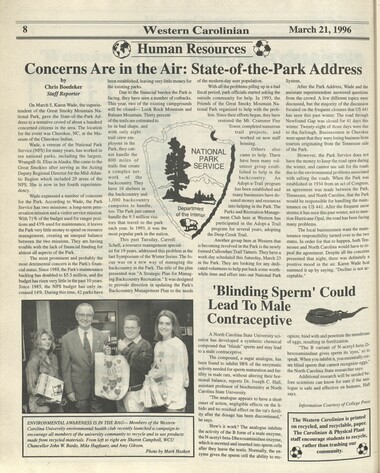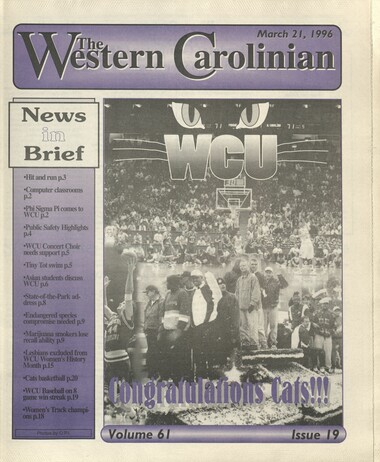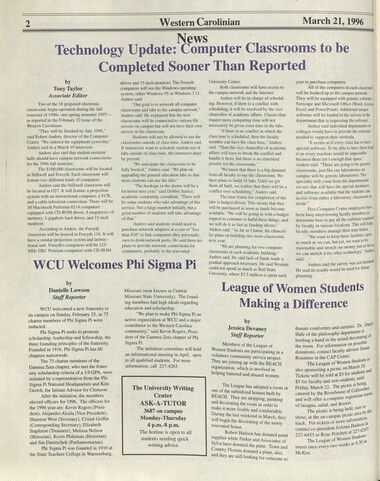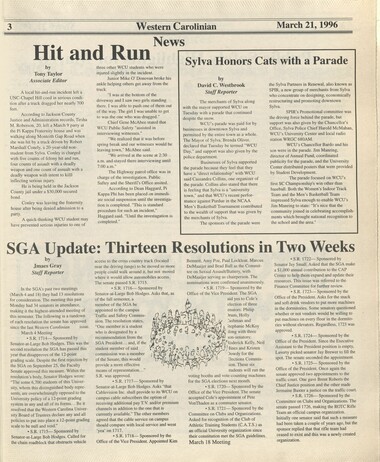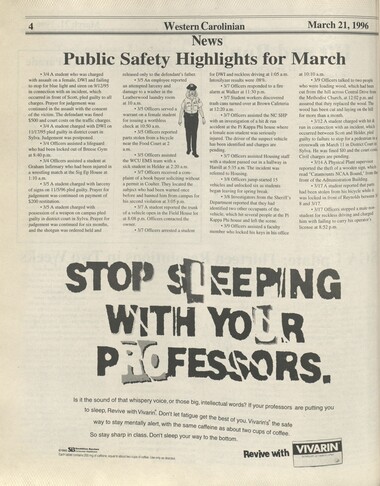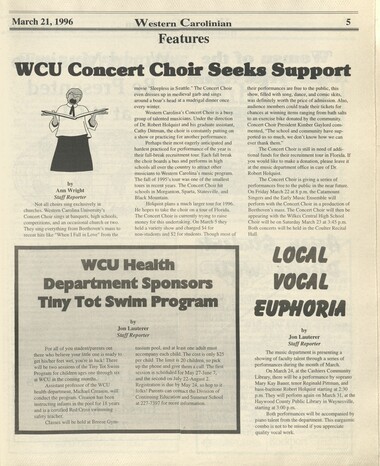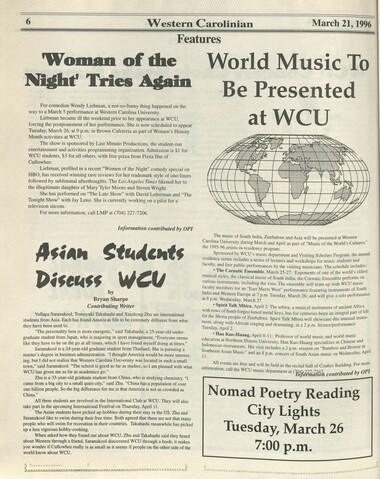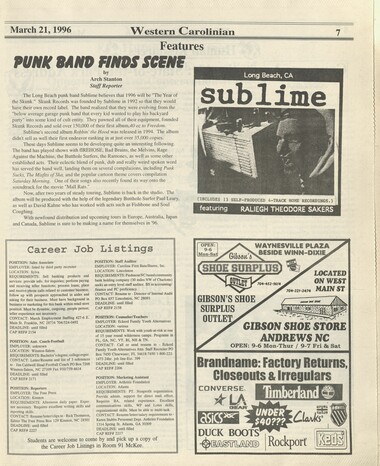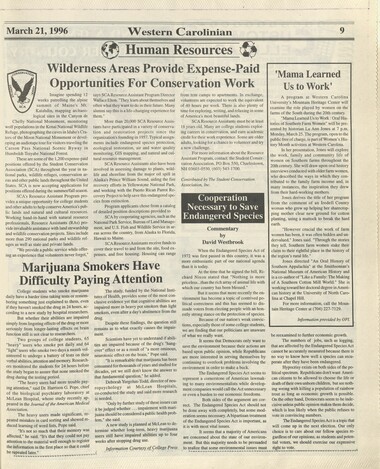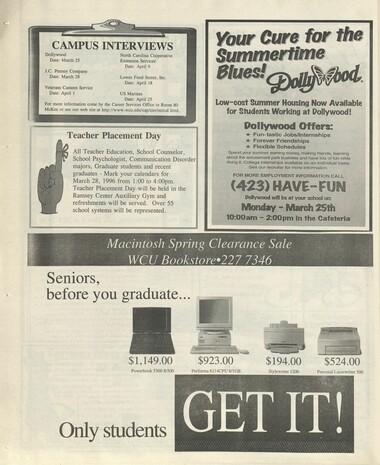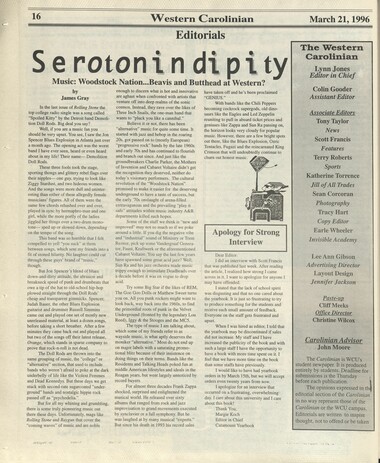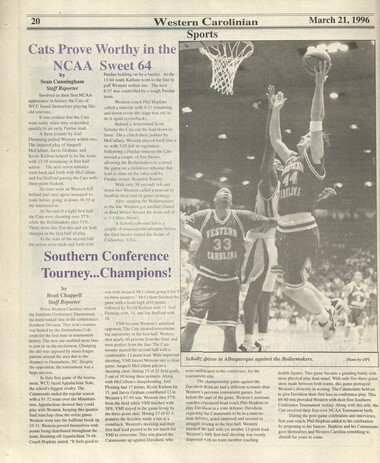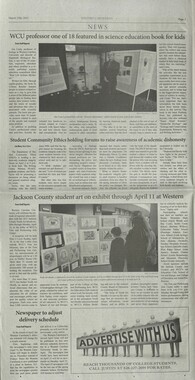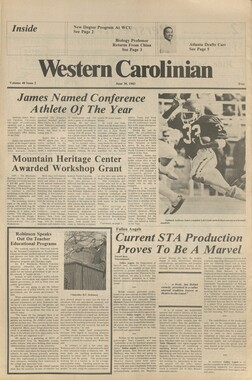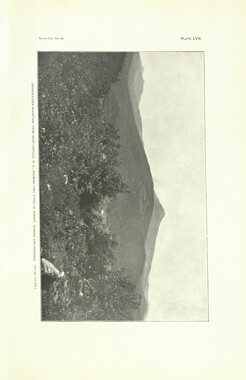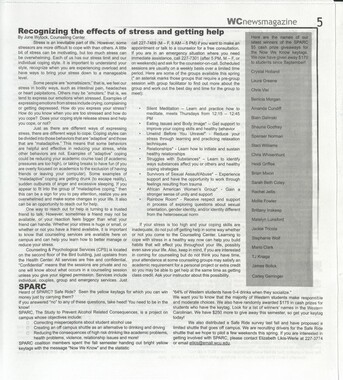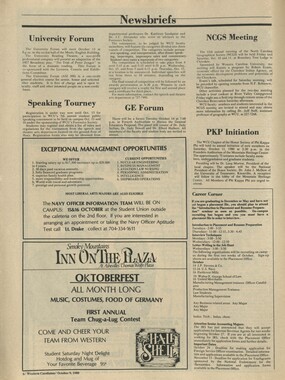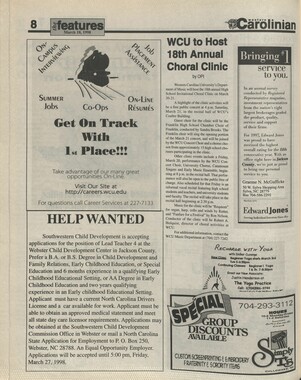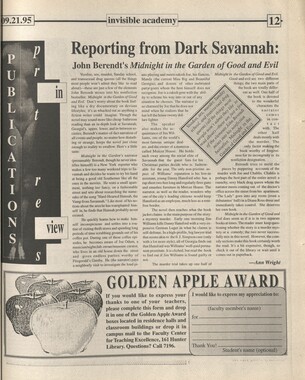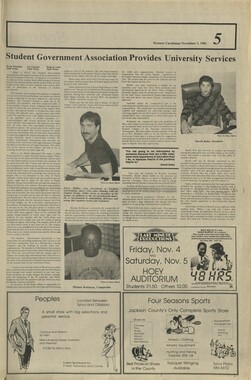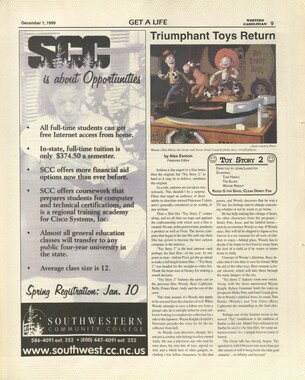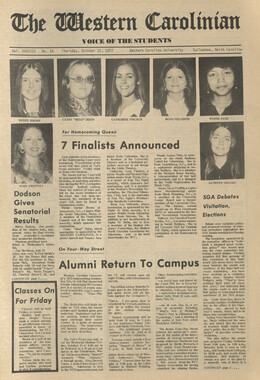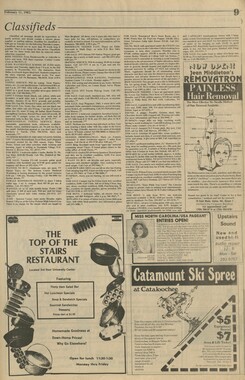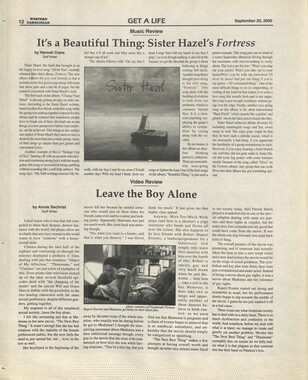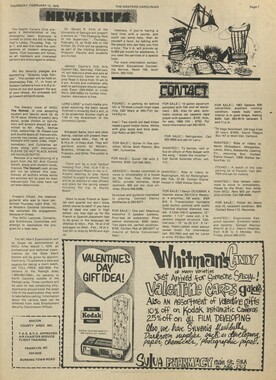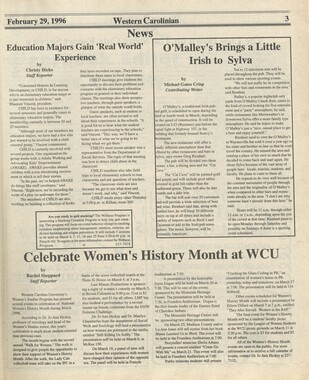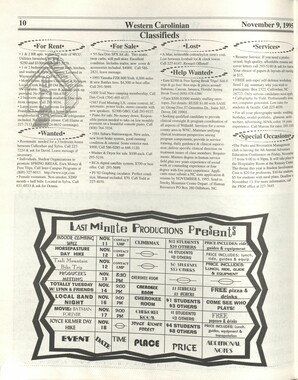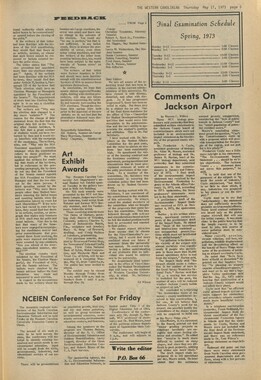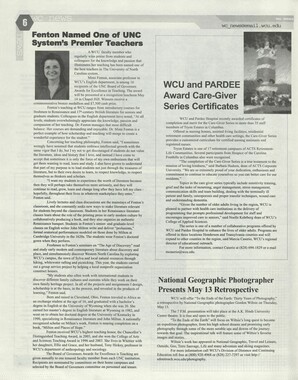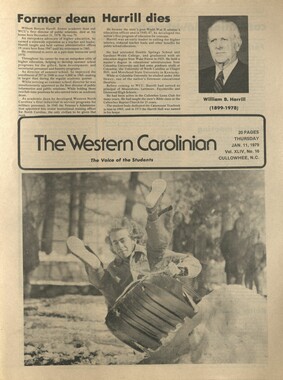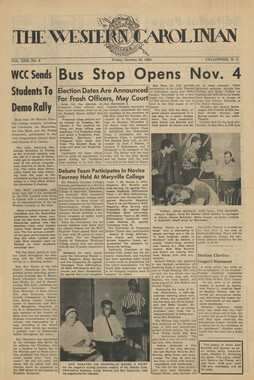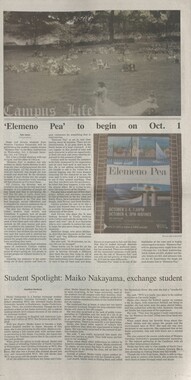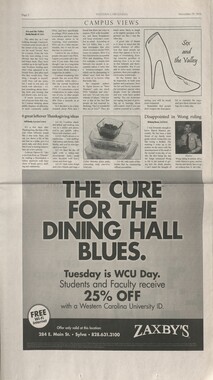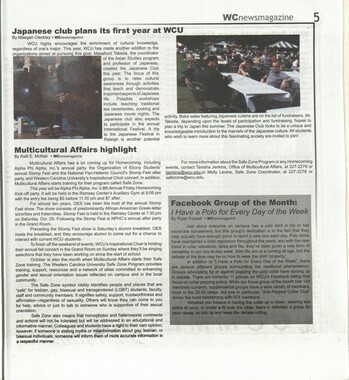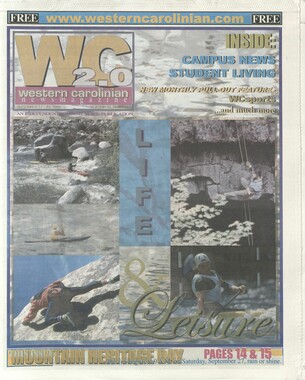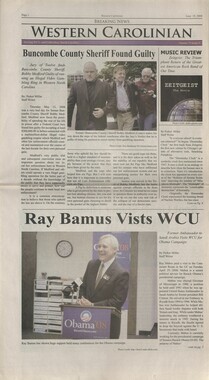Western Carolina University (21)
View all
- Canton Champion Fibre Company (2308)
- Cherokee Traditions (291)
- Civil War in Southern Appalachia (165)
- Craft Revival (1942)
- George Masa Collection (135)
- Great Smoky Mountains - A Park for America (2901)
- Highlights from Western Carolina University (422)
- Horace Kephart (941)
- Journeys Through Jackson (159)
- LGBTQIA+ Archive of Jackson County (85)
- Oral Histories of Western North Carolina (314)
- Picturing Appalachia (6798)
- Stories of Mountain Folk (413)
- Travel Western North Carolina (153)
- Western Carolina University Fine Art Museum Vitreograph Collection (129)
- Western Carolina University Herbarium (92)
- Western Carolina University: Making Memories (738)
- Western Carolina University Publications (2491)
- Western Carolina University Restricted Electronic Theses and Dissertations (146)
- Western North Carolina Regional Maps (71)
- World War II in Southern Appalachia (131)
University of North Carolina Asheville (6)
View all
- Allanstand Cottage Industries (62)
- Appalachian National Park Association (53)
- Bennett, Kelly, 1890-1974 (1463)
- Berry, Walter (76)
- Brasstown Carvers (40)
- Carver, George Washington, 1864?-1943 (26)
- Cathey, Joseph, 1803-1874 (1)
- Champion Fibre Company (233)
- Champion Paper and Fibre Company (297)
- Cherokee Indian Fair Association (16)
- Cherokee Language Program (22)
- Crowe, Amanda (40)
- Edmonston, Thomas Benton, 1842-1907 (7)
- Ensley, A. L. (Abraham Lincoln), 1865-1948 (275)
- Fromer, Irving Rhodes, 1913-1994 (70)
- George Butz (BFS 1907) (46)
- Goodrich, Frances Louisa (120)
- Grant, George Alexander, 1891-1964 (96)
- Heard, Marian Gladys (60)
- Kephart, Calvin, 1883-1969 (15)
- Kephart, Horace, 1862-1931 (313)
- Kephart, Laura, 1862-1954 (39)
- Laney, Gideon Thomas, 1889-1976 (439)
- Masa, George, 1881-1933 (61)
- McElhinney, William Julian, 1896-1953 (44)
- Niggli, Josephina, 1910-1983 (10)
- North Carolina Park Commission (105)
- Osborne, Kezia Stradley (9)
- Owens, Samuel Robert, 1918-1995 (11)
- Penland Weavers and Potters (36)
- Roberts, Vivienne (15)
- Roth, Albert, 1890-1974 (142)
- Schenck, Carl Alwin, 1868-1955 (1)
- Sherrill's Photography Studio (2565)
- Southern Highland Handicraft Guild (127)
- Southern Highlanders, Inc. (71)
- Stalcup, Jesse Bryson (46)
- Stearns, I. K. (213)
- Thompson, James Edward, 1880-1976 (226)
- United States. Indian Arts and Crafts Board (130)
- USFS (683)
- Vance, Zebulon Baird, 1830-1894 (1)
- Weaver, Zebulon, 1872-1948 (58)
- Western Carolina College (230)
- Western Carolina Teachers College (282)
- Western Carolina University (2008)
- Western Carolina University. Mountain Heritage Center (18)
- Whitman, Walt, 1819-1892 (10)
- Wilburn, Hiram Coleman, 1880-1967 (73)
- Williams, Isadora (3)
- Cain, Doreyl Ammons (0)
- Crittenden, Lorraine (0)
- Rhodes, Judy (0)
- Smith, Edward Clark (0)
- Appalachian Region, Southern (2924)
- Asheville (N.C.) (1941)
- Avery County (N.C.) (26)
- Blount County (Tenn.) (195)
- Buncombe County (N.C.) (1672)
- Cherokee County (N.C.) (283)
- Clay County (N.C.) (556)
- Graham County (N.C.) (236)
- Great Smoky Mountains National Park (N.C. and Tenn.) (525)
- Haywood County (N.C.) (3569)
- Henderson County (N.C.) (70)
- Jackson County (N.C.) (4913)
- Knox County (Tenn.) (35)
- Knoxville (Tenn.) (13)
- Lake Santeetlah (N.C.) (10)
- Macon County (N.C.) (420)
- Madison County (N.C.) (215)
- McDowell County (N.C.) (39)
- Mitchell County (N.C.) (135)
- Polk County (N.C.) (35)
- Qualla Boundary (982)
- Rutherford County (N.C.) (76)
- Swain County (N.C.) (2182)
- Transylvania County (N.C.) (270)
- Watauga County (N.C.) (12)
- Waynesville (N.C.) (86)
- Yancey County (N.C.) (72)
- Aerial Photographs (3)
- Aerial Views (60)
- Albums (books) (4)
- Articles (1)
- Artifacts (object Genre) (228)
- Bibliographies (1)
- Biography (general Genre) (2)
- Cards (information Artifacts) (38)
- Clippings (information Artifacts) (191)
- Copybooks (instructional Materials) (3)
- Crafts (art Genres) (622)
- Depictions (visual Works) (21)
- Design Drawings (1)
- Drawings (visual Works) (185)
- Envelopes (73)
- Exhibitions (events) (1)
- Facsimiles (reproductions) (1)
- Fiction (general Genre) (4)
- Financial Records (12)
- Fliers (printed Matter) (67)
- Glass Plate Negatives (381)
- Guidebooks (2)
- Internegatives (10)
- Interviews (815)
- Land Surveys (102)
- Letters (correspondence) (1013)
- Manuscripts (documents) (618)
- Maps (documents) (177)
- Memorandums (25)
- Minutes (administrative Records) (59)
- Negatives (photographs) (6090)
- Newsletters (1290)
- Newspapers (2)
- Notebooks (8)
- Occupation Currency (1)
- Paintings (visual Works) (1)
- Pen And Ink Drawings (1)
- Periodicals (193)
- Personal Narratives (10)
- Photographs (12976)
- Plans (maps) (1)
- Poetry (5)
- Portraits (4568)
- Postcards (329)
- Programs (documents) (181)
- Publications (documents) (2443)
- Questionnaires (65)
- Relief Prints (26)
- Sayings (literary Genre) (1)
- Scrapbooks (282)
- Sheet Music (2)
- Slides (photographs) (402)
- Songs (musical Compositions) (2)
- Sound Recordings (796)
- Specimens (92)
- Speeches (documents) (18)
- Tintypes (photographs) (8)
- Transcripts (322)
- Video Recordings (physical Artifacts) (23)
- Text Messages (0)
- A.L. Ensley Collection (275)
- Appalachian Industrial School Records (7)
- Appalachian National Park Association Records (336)
- Axley-Meroney Collection (2)
- Bayard Wootten Photograph Collection (20)
- Bethel Rural Community Organization Collection (7)
- Blumer Collection (5)
- C.W. Slagle Collection (20)
- Canton Area Historical Museum (2110)
- Carlos C. Campbell Collection (462)
- Cataloochee History Project (64)
- Cherokee Studies Collection (4)
- Daisy Dame Photograph Album (5)
- Daniel Boone VI Collection (1)
- Doris Ulmann Photograph Collection (112)
- Elizabeth H. Lasley Collection (1)
- Elizabeth Woolworth Szold Fleharty Collection (4)
- Frank Fry Collection (95)
- George Masa Collection (173)
- Gideon Laney Collection (452)
- Hazel Scarborough Collection (2)
- Hiram C. Wilburn Papers (28)
- Historic Photographs Collection (236)
- Horace Kephart Collection (861)
- Humbard Collection (33)
- Hunter and Weaver Families Collection (1)
- I. D. Blumenthal Collection (4)
- Isadora Williams Collection (4)
- Jesse Bryson Stalcup Collection (47)
- Jim Thompson Collection (224)
- John B. Battle Collection (7)
- John C. Campbell Folk School Records (80)
- John Parris Collection (6)
- Judaculla Rock project (2)
- Kelly Bennett Collection (1482)
- Love Family Papers (11)
- Major Wiley Parris Civil War Letters (3)
- Map Collection (12)
- McFee-Misemer Civil War Letters (34)
- Mountain Heritage Center Collection (4)
- Norburn - Robertson - Thomson Families Collection (44)
- Pauline Hood Collection (7)
- Pre-Guild Collection (2)
- Qualla Arts and Crafts Mutual Collection (12)
- R.A. Romanes Collection (681)
- Rosser H. Taylor Collection (1)
- Samuel Robert Owens Collection (94)
- Sara Madison Collection (144)
- Sherrill Studio Photo Collection (2558)
- Smoky Mountains Hiking Club Collection (616)
- Stories of Mountain Folk - Radio Programs (374)
- The Reporter, Western Carolina University (510)
- Venoy and Elizabeth Reed Collection (16)
- WCU Gender and Sexuality Oral History Project (32)
- WCU Mountain Heritage Center Oral Histories (25)
- WCU Oral History Collection - Mountain People, Mountain Lives (71)
- WCU Students Newspapers Collection (1923)
- Western North Carolina Tomorrow Black Oral History Project (69)
- William Williams Stringfield Collection (2)
- Zebulon Weaver Collection (109)
- African Americans (390)
- Appalachian Trail (35)
- Artisans (521)
- Cherokee art (84)
- Cherokee artists -- North Carolina (10)
- Cherokee language (21)
- Cherokee pottery (101)
- Cherokee women (208)
- Church buildings (190)
- Civilian Conservation Corps (U.S.) (111)
- College student newspapers and periodicals (2012)
- Dams (107)
- Dance (1023)
- Education (222)
- Floods (61)
- Folk music (1015)
- Forced removal, 1813-1903 (2)
- Forest conservation (220)
- Forests and forestry (1196)
- Gender nonconformity (4)
- Great Smoky Mountains National Park (N.C. and Tenn.) (181)
- Hunting (45)
- Landscape photography (25)
- Logging (119)
- Maps (83)
- Mines and mineral resources (8)
- North Carolina -- Maps (18)
- Paper industry (38)
- Postcards (255)
- Pottery (135)
- Railroad trains (72)
- Rural electrification -- North Carolina, Western (3)
- School integration -- Southern States (2)
- Segregation -- North Carolina, Western (5)
- Slavery (5)
- Sports (452)
- Storytelling (243)
- Waterfalls -- Great Smoky Mountains (N.C. and Tenn.) (66)
- Weaving -- Appalachian Region, Southern (280)
- Wood-carving -- Appalachian Region, Southern (328)
- World War, 1939-1945 (173)
Western Carolinian Volume 61 Number 19
Item
Item’s are ‘child’ level descriptions to ‘parent’ objects, (e.g. one page of a whole book).
-
-
8 Western Carolinian March 21,1996 Human Resources Concerns Are in the Air: State-of-the-Park Address by Chris Boedeker Staff Reporter On March 5, Karen Wade, the superintendent of the Great Smoky Mountain National Park, gave the State-of-the-Park Address to a tentative crowd of about a hundred concerned citizens in the area. The location for the event was Cherokee, NC, at the Museum of the Cherokee Indian. Wade, a veteran of the National Park Service (NPS) for many years, has worked in ten national parks, including the largest, Wrangall-St. Elias in Alaska. She came to the Great Smokies after serving as the Acting Deputy Regional Director for the Mid-Atlantic Region which included 29 areas of the NPS. She is now in her fourth superinten- dency. Wade expressed a number of concerns for the Park. According to Wade, the Park Service has two missions: a long-term preservation mission and a visitor service mission. With 71 % of the budget used for ranger positions and 43% used for maintenance, it leaves the Park very little money to spend on resource management, creating an unequal balance between the two missions. They are having trouble with the lack of financial funding for almost all aspects of the Park. The most prominent and probably the most detrimental concern is the Park's financial status. Since 1988, the Park's maintenance backlog has doubled to $5.3 million, and the budget has risen very little in the past 10 years. Since 1985, the NPS budget has only increased 14%. During this time, 42 parks have been established, leaving very little money for the existing parks. Due to the financial burden the Park is facing, they have seen a number of cutbacks. This year, two of the existing campgrounds will be closed— Look Rock Mountain and Balsam Mountain. Thirty percent of the trails are estimated to be in bad shape, and with only eight trail crew employees in the Park, they cannot handle the 800 miles of trails that create a complex network of the backcountry. They have 16 shelters in the backcountry and 1,000 backcountry campsites to handle, too. The Park just cannot handle the 9.3 million visitors that travel to the park each year. In 1993, it was the most popular park in the nation. This past Tuesday, Carroll Schell, a resource management specialist for 19 years, addressed this problem at the last Symposium of the Winter Series. The focus was on a new way of managing the backcountry in the Park. The title of the plan presented was "A Strategic Plan for Managing Backcountry Recreation." It was designed to provide direction in updating the Park's Backcountry Management Plan to the needs of the modern-day user population. With all the problems piling up in a bad fiscal period, park officials started asking the outside community for help. In 1993, the Friends of the Great Smoky Mountain National Park organized to help with the problem. Since their efforts began, they have restored the Mt. Crammer Fire Tower, completed numerous trail projects, and worked on new staff housing. Others also came to help. There have been many volunteer group established to help in the backcountry. An Adopt-a-Trail program has been established and many businesses have donated money and resources into helping in the Park. The Parks and Recreation Management Club here at Western has participated in the Adopt-a Trail program for several years, adopting the Deep Creek Trail. Another group here at Western that is becoming involved in the Park is the newly formed Cullowhee Trail Tamers. They have a work day scheduled this Saturday, March 23 in the Park. They are looking for any dedicated volunteers to help put back some worthwhile time and effort into our National Park System. After the Park Address, Wade and the assistant superintendent answered questions from the crowd. A few different topics were discussed, but the majority of the discussion focused on the frequent closures that US 441 has seen this past winter. The road through Newfound Gap was closed for 41 days this winter. Twenty-eight of those days were due to the furlough. Businessmen in Cherokee were upset that they were losing business from tourists originating from the Tennessee side of the Park. However, the Park Service does not have the money to keep the road open during the winter, and cannot use salt for the roads due to the environmental problems associated with salting the roads. When the Park was established in 1934 from an act of Congress, an agreement was made between the Park, Tennessee, and North Carolina, that the Park would be responsible for handling the maintenance on US 441. After the frequent snow storms it has seen this past winter, not to mention Hurricane Opal, the road has been facing many problems. The local businessmen want the maintenance responsibility turned over to the two states. In order for that to happen, both Tennessee and North Carolina would have to repeal the agreement. Despite all the concerns presented that night, there was definitely a positive mood in the air. Karen Wade best summed it up by saying, "Decline is not acceptable." 'Blinding Sperm' Could Lead To Male Contraceptive ENVIRONMENTAL AWARENESS IS IN THE BAG— Members of the Western Carolina University environmental health club recently launched a campaign to encourage all members of the university community to recycle and to use products made from recycled materials. From left to right are Sharon Campbell, WCU Chancellor John W. Bardo, Mike Hupfauer, and Amy Gibson. Photo by Mark Haskett A North Carolina State University scientist has developed a synthetic chemical compound that "blinds" sperm and may lead to a male contraceptive. The compound, a sugar analogue, has been found to inhibit 98% of the enzymatic activity needed for sperm maturation and fertility in male rats, without altering their hormonal balance, reports Dr. Joseph C. Hall, assistant professor of biochemistry at North Carolina State University. "The analogue appears to have a short onset of action, negligible effects on the libido and no residual effect on the rat's fertility after the dosage has been discontinued," he says. How's it work? The analogue inhibits the activity of the B form of a male enzyme, the N-acetyl-beta-Dhexosaminidase enzyme, which is secreted and inserted into sperm cells after they leave the testis. Normally, the enzyme gives the sperm cell the ability to rec ognize, bind with and penetrate the membrane of eggs, resulting in fertilization. "The B variant of N-acetyl-beta-l> hexosaminidase gives sperm its 'eyes, s speak. When you inhibit it, you essentially create blind sperm that cannot recognize eggs, the North Carolina State researcher says. Additional research will be needed De- fore scientists can know for sure if the a ^ logue is safe and effective on humans, Ha says. Information Courtesy of College Press The Western Carolinian is printed on recycled, and recyclable, paper- The Carolinian & Physical Plant staff encourage students to recyc e, rather than trashing our^fl r£jk community. (J^
Object
Object’s are ‘parent’ level descriptions to ‘children’ items, (e.g. a book with pages).
-
The Western Carolinian is Western Carolina University's student-run newspaper. The paper was published as the Cullowhee Yodel from 1924 to 1931 before changing its name to The Western Carolinian in 1933.
-
